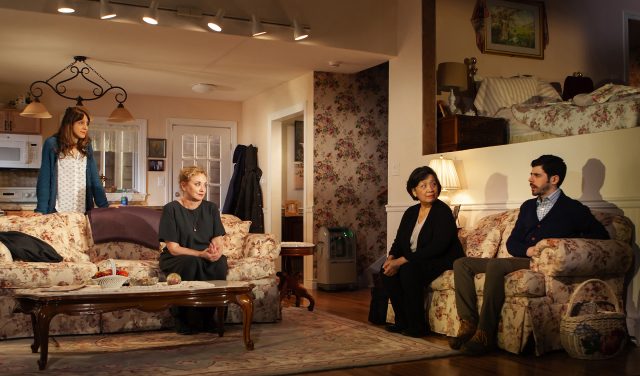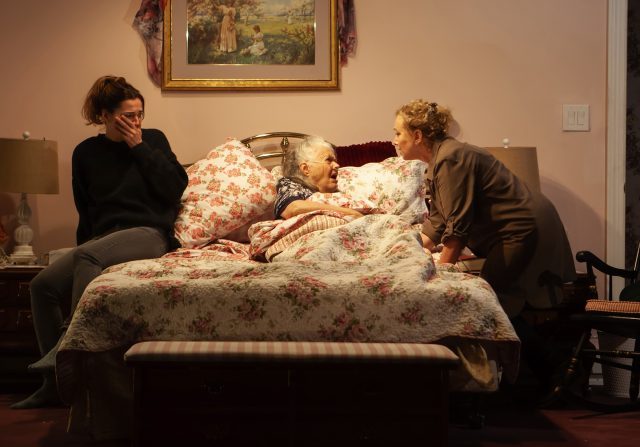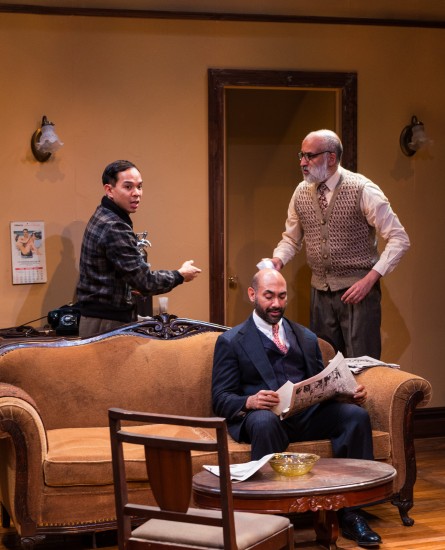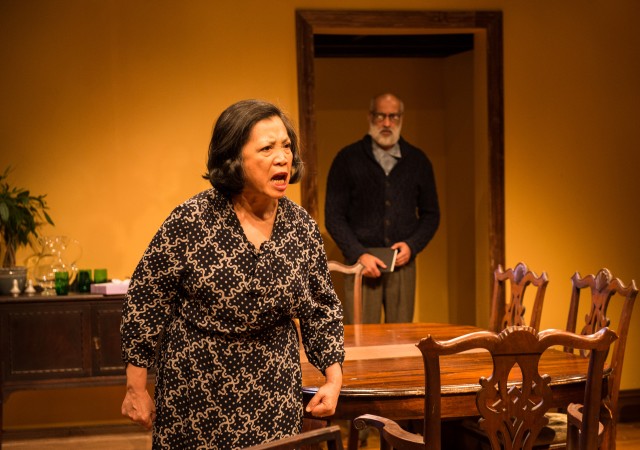
A dysfunctional family receives important information about hospice care in Peace for Mary Frances (photo by Monique Carboni)
The New Group at the Pershing Square Signature Center
The Alice Griffin Jewel Box Theatre
480 West 42nd St. between Tenth & Eleventh Aves.
Tuesday – Sunday through June 17, $30-$125
www.thenewgroup.org
Having recently lived through situations resembling those in Peace for Mary Frances, Lily Thorne’s debut play that opened tonight at the Alice Griffin Jewel Box Theatre at the Pershing Square Signature Center, it wasn’t easy for me to sit through the New Group production. Unfortunately, that wasn’t because the 155-minute play was right on target, offering me a cathartic experience. Thorne, who has worked on several documentaries and is currently getting her MFA in playwriting at Brooklyn College, has written a lifeless drama about end-of-life care. It feels more like an instructional primer on what to do when a loved one is dying than a dramatic work that sheds light on what can be a devastating time. Eighty-seven-year-old Lois Smith stars as Mary Frances, the matriarch of a dysfunctional West Hartford family. As her quality of life deteriorates, Mary Frances tells her Armenian-American family that she wants hospice care so she can be as comfortable as possible at home for whatever time she has left. It proves difficult for her two daughters, Fanny (Johanna Day), a divorced drug addict who works as a security guard at the Y and is estranged from her daughter, and Alice (J. Smith-Cameron), a divorced astrologist with no money and two grown children of her own, Helen (Heather Burns), a TV star, and Rosie (Natalie Gold), a married mom with two kids. While Fanny and Alice fight brutally, nonstop, Mary Frances’s son, Eddie (Paul Lazar), a divorced lawyer, comes by once a week, watches TV, and eats sushi, avoiding getting involved in anything of real importance. As Mary Frances hangs on longer than expected — “Typically, people don’t leave this life until their unfinished business is taken care of,” hospice nurse Bonnie (Mia Katigbak) says — the family relationships devolve into a crazy mess.

Mary Frances (Lois Smith) argues with daughter Alice (J. Smith Cameron) as granddaughter Helen (Heather Burns) looks on in New Group world premiere (photo by Monique Carboni)
Peace for Mary Frances takes place on Dane Laffrey’s two-level set, a suburban living room / kitchen and Mary Frances’s upstairs bedroom, all decked out in flowery designs. Director Lila Neugebauer has done sensational work, particularly at Lincoln Center and the Signature, with such plays as At Home at the Zoo, The Antipodes, Everybody, The Wolves, and The Wayside Motor Inn, showing an innate sense of narrative structure, choreographed movement, and cutting-edge staging that both challenges and entertains. But she has little to work with here, unable to bring life to Thorne’s deadening dialogue and forced conflicts. Early on, Rosie and Helen are unable to lift Mary Frances off the couch. But when the scene ends a few moments later, Smith gets up herself and walks up the stairs. It instantly destroys the theatrical illusion that Mary Frances is dying, taking the audience out of the story and damaging the empathy we are trying to have with the characters. In addition, throughout the play, there is a hard-to-identify noise that seems to be coming from the front left of the stage. My companion and I wondered whether it was an audience member who was breathing very loudly (or was snoring), the air-conditioning, or part of the show, sounds meant to represent Mary Frances’s oxygen machine, mimicking the rhythm of her breathing. I even asked an usher what it was during intermission and she was not sure. (The script does say, “The machines are on and pumping throughout the play.”) If it was indeed intentional, it was ridiculously distracting. The play also sadly wastes the talent of two-time Tony nominee and Obie winner Smith, who recently starred in the stage and film versions of Marjorie Prime and previously did excellent work at the Signature in Annie Baker’s John and Sam Shepard’s Heartless. Despite an extremely talented director and an acting legend, Thorne’s debut is on life support from the beginning, and it goes on far too long before the plug is pulled.





